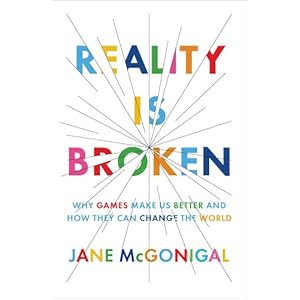Defining “Win”
 It’s the middle of conference season – last week the annual Game Developers Conference was in San Francisco. This week, the South by Southwest Interactive Conference (SXSW) is going on in Austin Texas (with the music and film festivals next week). And the PAX East game conference starts tomorrow (March 11th) in Boston.
It’s the middle of conference season – last week the annual Game Developers Conference was in San Francisco. This week, the South by Southwest Interactive Conference (SXSW) is going on in Austin Texas (with the music and film festivals next week). And the PAX East game conference starts tomorrow (March 11th) in Boston.
Unfortunately, I won’t be at any of them this year. Hopefully I’ll be at GDC and SXSW next year – I taught at the GDC several years ago, and I hear so many great things about SXSW that I have to experience it firsthand.
 One person who WILL be at all of these conferences is author, innovator and game expert Jane McGonigal. I’m reading her book ”Reality is Broken: Why Games Make Us Better and How They Can Change the World” (HIGHGLY recommended – check out Jane’s presentation at the Dice Conference in Feb 2011 for a brief overview).
One person who WILL be at all of these conferences is author, innovator and game expert Jane McGonigal. I’m reading her book ”Reality is Broken: Why Games Make Us Better and How They Can Change the World” (HIGHGLY recommended – check out Jane’s presentation at the Dice Conference in Feb 2011 for a brief overview).
I’ve played games for years (less so now due to a lack of time), but I noticed a lot of parallels between that gaming experience McGonigal describes – the experience people seek out in lieu of flawed “reality” – and improv.
For example…
Everyone at some point in their lives has experienced “flow” – that state where you’re so completely absorbed in whatever you’re doing that time seems to disappear. You hear about it in sports (being in the zone), playing video games (gamers losing hours playing), and in improv. The state of flow can only be created when people voluntarily enter into into some activity that has clear rules and challenging (but achievable) goals.
At first, I thought I found a discrepancy. All three do have the “voluntary” component (people are only forced to play sports in school, and no one enters flow-state when begrudgingly forced to play third-grade dodge ball). But sports and games have very clear rules and goals – improv doesn’t. Improv games and a few improv show formats (theatresports) may have rules, but the goals aren’t always clear (what’s the goal of an improvised musical?) and often playing an improv game perfectly is both dull to watch AND play (there is nothing more boring than seeing a perfectly executed Alphabet scene).
That’s because the goal ISN’T to get it right, or be the most clever / funniest person on stage. The goal is to create theatre with the limits of the game imposed on it.
And if you’re doing it right, you should fail. If you REALLY try your hardest to recreate a fairy tale as if it were written by David Mamet, you will fail. If you REALLY try to put Broadway style and into a spontaneously-invented song about tacos, you will fail – it won’t be perfect, because there’s too much for your brain to handle (the music, the lyrics, the passion, the character, the rhymes). More experience will improve those individual skills, but you’ll never get them all perfect all the time.
The goal isn’t to play the game perfectly – the goal is to play the game hard. This is true no matter what type of improv you’re doing – try your hardest to spontaneously create a genuine Spaghetti Western, and you’ll fail, and it will be wonderful (and funny) to both struggle and watch the struggle.
Buster Keaton once said that comedy was creating a character, giving them a goal and having them try their hardest. When Keaton created characters that were comically flawed, but trying their hardest, comedy flowed.
My friend Dan Klein, improv teacher at Stanford Drama (and a fantastic performer) once said that watching a brilliant mind struggling to recover is massively more interesting than a brilliant mind performing brilliantly.
McGonigal says that gamers will spend infinitely more time failing than they will succeeding – they’ll go back over and over and over to overcome a particular game challenge. They’ll experience a “fiero moment” (a fierce sense of pride due to achievement) when they finally overcome it, then repeat that process over and over again throughout a game.
When performing an improv show you’re going to have all night to try to create a committed believable characters in spontaneously created scenes, and when you hit one of those moments where it all goes right (which are rare), buckle-up buttercup – the show ain’t over (or there’s another one next week)!
So if you’re an improvisor, redefine winning as playing your hardest as you can to be truthful to the scene.
If you’re not an improvisor, focus on playing YOUR game, no matter what it is, as hard as you can, and see if that isn’t more engaging than constantly focusing on “the win”.
The struggle is the goal. If you’re playing the game as hard as you can, you’re winning.
